Over 70 foreign students from 21 countries recently attended a three-day getaway to Anhui Province. Hosted by Shanghai International Studies University (SISU) as part of the Shanghai Summer School program, the journey included climbing Huangshan Mountain and visiting Hongcun village and its tea plantations, enhancing the students' understanding of Chinese culture.
Shanghai Summer School (3S) is a scholarship program launched by Shanghai Municipal Education Commission as a window for international cooperation. It aims to set up a platform for educational exchanges between Shanghai and the world while attracting talented foreign students to study in Shanghai and learn the Chinese language while experiencing local culture.
During the one-month program, foreign students engage in intensive language learning and cultural exploring activities through various projects provided by dozens of colleges and universities in Shanghai.
This year, SISU hosted four projects affiliated to the 3S program: the Spanish-Speaking Countries Project, the Russian Project, the Belt and Road Countries Project, and the Middle East Project.
They hoped these would arouse further international interest in Chinese history as well as the social development of contemporary China.
Students were arranged according to their language skills and provided tailor-made curriculum. SISU also offered a rich array of extracurricular activities to allow the foreign students to interact with Chinese people, including visiting Shanghainese families, practicing Chinese traditional calligraphy and tai chi boxing, sightseeing and attending lectures on Chinese culture, diplomacy and economics by professors from various local universities.
In addition, SISU paired each international student with a Chinese student as language partners to enhance and facilitate communication between the youth.
Zhang Hongjiang, project manager of the international office, School of Chinese Studies and Exchange, SISU, told the Global Times that it was a huge undertaking to implement all of these activities while making sure that students coming from different countries with different social habits and customs feel comfortable and at home in Shanghai.
Based on his observations, most of the foreign students were more interested in the recent development of modern China, including its mobile payment and shared-economy systems, which haven't yet been accurately or thoroughly included in Western educational curriculum.
"They may have heard about Confucius and calligraphy, but they don't know much about Alipay or Mobike or the rapid development of China's Internet industry," Zhang said.
Lasting impressions
Warinrat Chaiwan, a law student from Chiang Mai, Thailand, visiting China for the first time, said she was impressed by both Shanghai and the summer camp program.
"I love the transportation system in Shanghai. In my city, public transportation has many traffic jam problems. There are no traffic jams in Shanghai," she said.
The recent explosion of shared bicycles in the city also left a lasting impression on Chaiwan. "I think Mobikes are very good for the environment. I think Chiang Mai should follow China," she said, adding that the proliferation of QR codes in daily life was also a big surprise for her. "In Chiang Mai, people only use cash."
Chaiwan said she joined the 3S program in the hopes of learning more about Chinese language and culture. "I think it is useful for me. The more language you know, the more benefit you have. Knowing Chinese can help me find a good job in Thailand," said Chaiwan, who is in fact half Thai and half Chinese - her grandparents immigrated to Thailand from China.
"In Chiang Mai, there are always many Chinese tourists who I want to speak with," she exclaimed. After encountering a number of Chinese tourists who she couldn't communicate with, she finally decided to enroll in a language school in Chiang Mai to learn Chinese.
"Many (students) have given up because Putonghua is so difficult. But I think we (Thai) have an advantage to learn Chinese. It has four tones and Thai has five tones," she said.
Olga Osuna Gómez, a Chinese-language teacher from Spain, has been teaching Putonghua in Málaga for the past 10 years. She said more and more people are learning Chinese in Spain, with her students ranging in age from 14 to 80 years old.
"The elder Spanish people learn Chinese handwriting to keep their memory and find peace with themselves. Every time I come to China I learn something new. I appreciate being given the chance to improve my Chinese in China," Gómez said.
Though the 3S project concludes at the end of July, many students expressed a desire to further their studies in China and have begun applying for degree programs in Shanghai, said Zhang.
"We hope more foreign students can apply for degrees here. They play an important role in people-to-people communication between China and their home countries," he said.
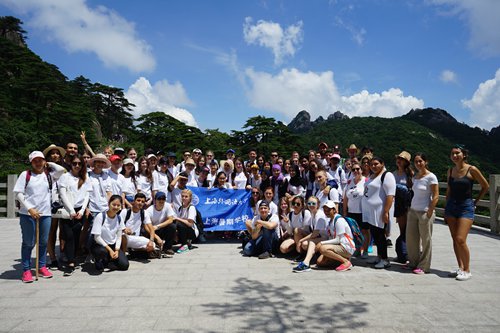
Foreign students pose at Huangshan Mountain during the Shanghai Summer School program.

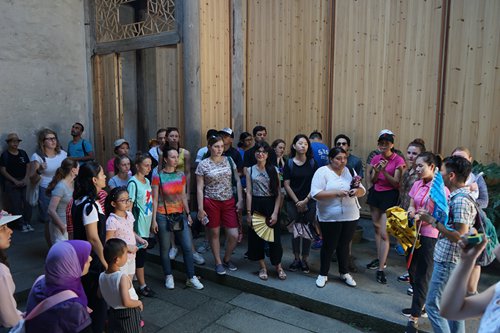
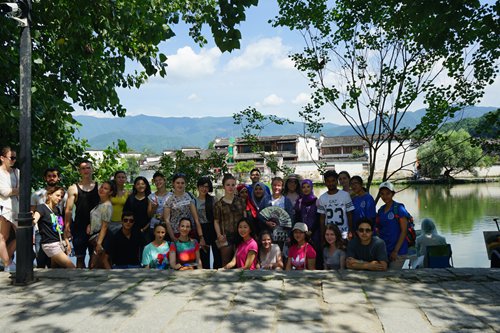
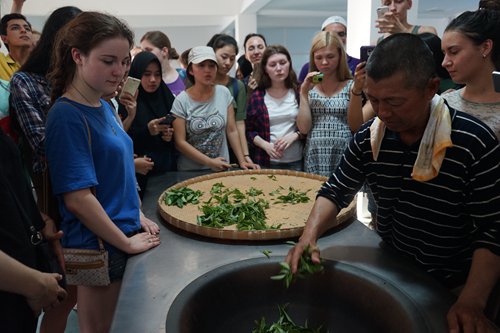
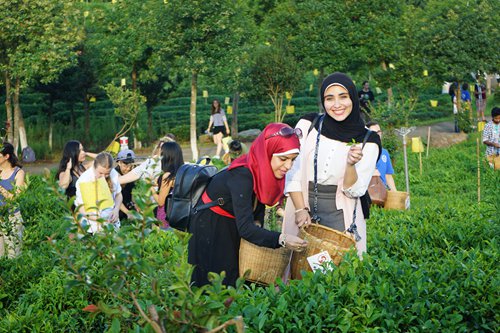
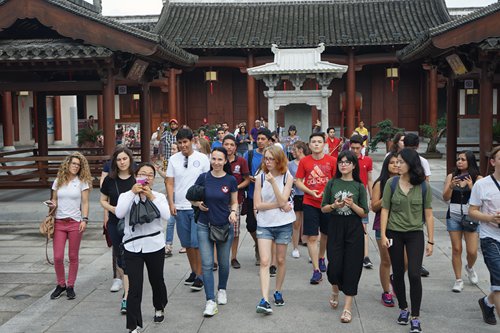
Foreign students are engaged in various activities during a three-day getaway to Anhui Province. Photos: Feng Yu/GT

